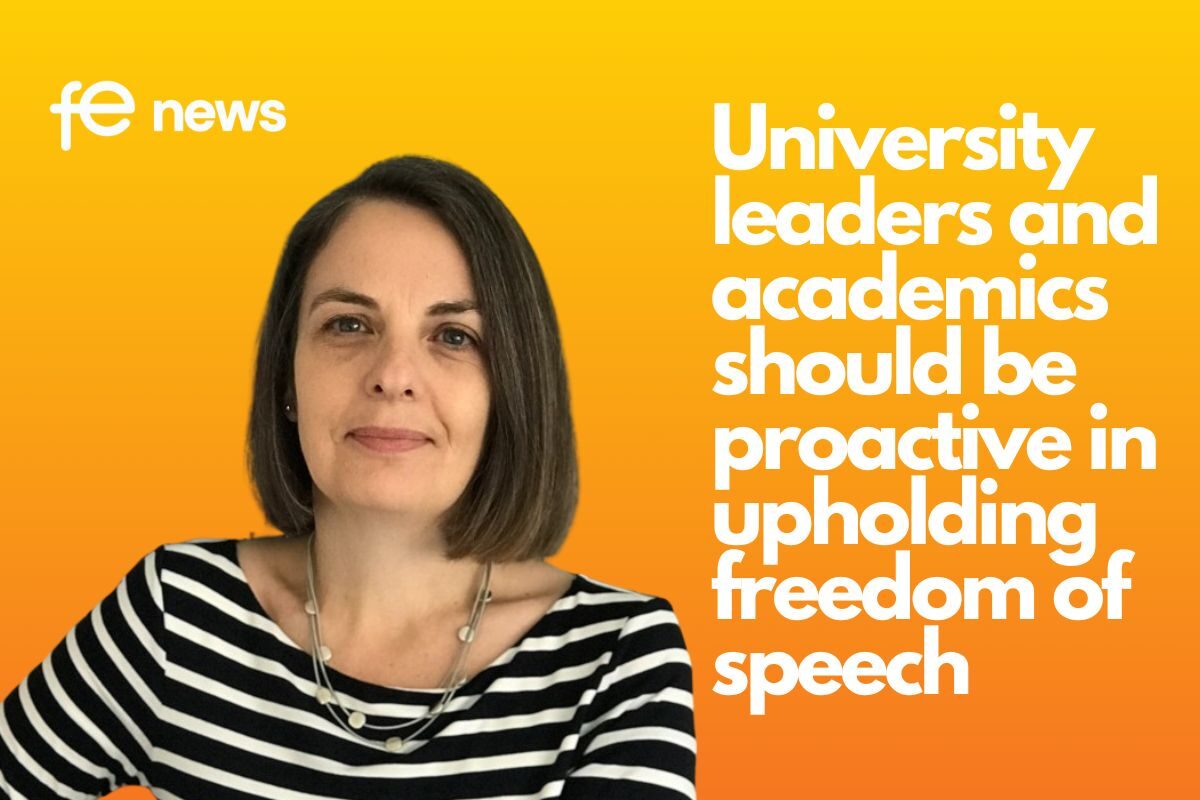University leaders and academics should be proactive in upholding freedom of speech

Office for Students (OfS) chief executive Susan Lapworth has said that university leaders and academics should be proactive in upholding freedom of speech on their campuses, ensuring their policies and processes support free speech and academic freedom.
Her message is delivered as she offers her annual commentary on higher education in England in the OfS annual review, published today, Tackling poor quality provision, ensuring students from all backgrounds are able to enter higher education and succeed in their studies, and protecting freedom of speech on campus are the key priorities for the Office for Students (OfS) in 2023 that she identifies in the annual review.
Alongside the review, the OfS has published a new Insight brief and is holding an Insight event on freedom of speech this morning [15 December].
The Insight brief sets out the current regulatory and legal landscape for freedom of speech. It provides a summary of recent evidence in this area, including surveys of students and academics. The brief reiterates the OfS’s long-standing view that universities must embrace the widest range of lawful views. The role of the OfS is not to take sides in the contested debates that feature in the higher education sector. Instead, the OfS must apply its understanding of the law to the facts of an individual case with care and impartiality.
These issues will be explored at the OfS’s Insight event. Alongside OfS chair Lord Wharton and chief executive Susan Lapworth, contributors to the event include:
- Claire Coutinho MP, Minister for Children, Families and Wellbeing
- Akua Reindorf, Equality and Human Rights Commission (EHRC) commissioner
- Dr John Tomasi, President of Heterodox Academy in the United States
- Patrick O’Donnell, Account Executive, past President of University of York Students’ Union
- Baroness Anderson, CEO of Index on Censorship
- Professor Steve West, President of Universities UK and Vice-Chancellor of the University of the West of England.
Susan Lapworth explains the importance of protecting freedom of speech and academic freedom in her commentary to the annual review. She says:
“Along with academic freedom, freedom of expression is an essential underpinning principle of UK higher education and democratic values. The core mission of universities and colleges is the pursuit of knowledge, and the principles of free speech and academic freedom are fundamental to this purpose. They provide a necessary context for advancing new ideas, encouraging productive debate, and challenging conventional wisdom.
“Legislation before Parliament at the time of writing proposes a strengthened role for the OfS in regulating free speech in universities and their students’ unions. Institutions would be required to take steps to promote free speech within the law, rather just to secure it. However, the OfS has had a role from its inception in regulating how universities address their free speech obligations, and will continue to do so where appropriate in future interventions.
“Universities have important legal obligations relating to freedom of speech and academic freedom within the law, including obligations that relate to their policies and processes. I hope that 2023 will be the year when those looking at our sector will see university leaders proactively focusing on their compliance with these obligations. However, this cannot be achieved without careful consideration of potentially competing legal rights and obligations, such as the framework of protection against unlawful discrimination and harassment set out in the Equality Act 2010. For example, there is no legal justification for racial discrimination in the name of free speech.”
Another priority is to ensure high quality courses that deliver positive outcomes for students. Addressing this priority, Susan Lapworth says:
“With our revised quality conditions, our focus is ensuring courses deliver a high quality education for students and lead to successful outcomes. In 2023, we will increase our regulatory activity, investigating courses and providers where we are concerned our requirements may not be satisfied. This will include an assessment of performance against our new thresholds for student outcomes, as well as visits to providers by academic experts. We expect to publish reports on our findings.
“Our goal is to see improvements not just where we intervene, but more widely across the sector. Like any regulator, we have limited resources and we target them carefully to ensure that our interventions have a ripple effect, leading to improvements elsewhere. We will continue to ensure that our interventions are risk-based, and targeted where they can have most impact.”
The review also sets out the importance of universities and colleges working with schools to help raise attainment and improve equality of opportunity. On this issue, Susan Lapworth says:
“Partnerships and engagement between schools and higher education providers already happen to an extent (73 of the existing access and participation plans mention them) and can lead to useful opportunities for potential students to visit university campuses or to participate in access programmes. That work can be valuable and motivating. But it may not always touch the attainment gap that limits access and choice for many school pupils, particularly those from disadvantaged backgrounds. There are examples that go further, such as university-sponsored maths schools or multi-academy trusts.
“Universities can support partner schools and colleges through improving the skills of existing teachers, providing targeted academic support to school and college students, tackling non-academic barriers to learning, or supporting curriculum development. They could offer funding or personnel, including tutorial help, to provide practical support. The important thing is that the activities are coordinated and coherent, and based on evidence and evaluation to ensure their impact. We are clear that such work needs to be credibly focused on increasing pupils’ likelihood of getting into higher education and getting on once there. The variations to current access and participation plans that we are considering this year have given us considerably greater evidence of current and planned interventions in this area.
“Students from disadvantaged and minority backgrounds generally share the same aspirations as their peers, but not the expectation that the individuals, institutions and systems around them will support them sufficiently to make real choices about their lives. We aim to ensure that choice and not chance determines who accesses, and succeeds in, higher education.”











Responses